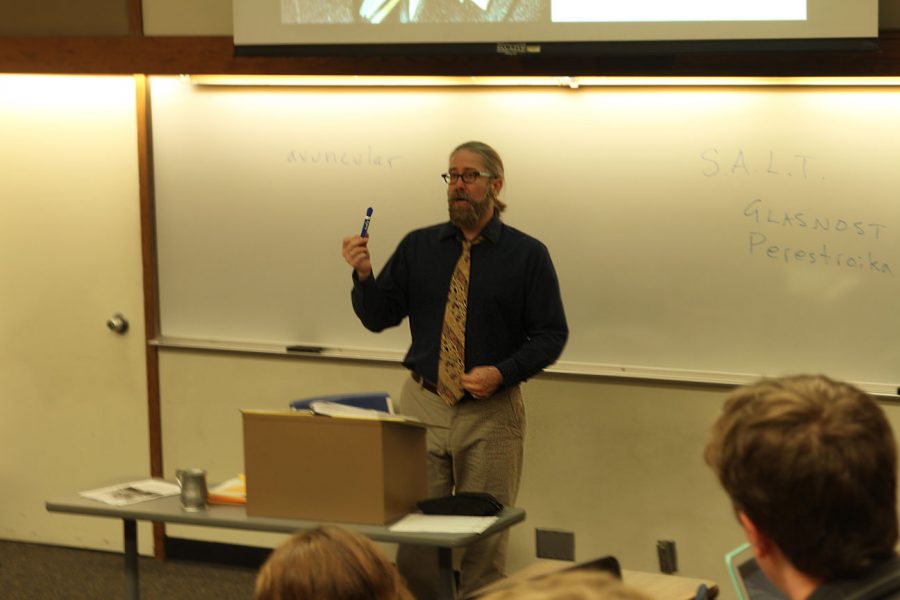Professor and part-time lyricist is recognized internationally
September 20, 2015
History professor Dr. Tony Silvestri has made a second career of writing lyrics. He has worked with 15 different composers, writing choir and opera pieces, 25 of which have been published with various music publishing companies.
Recent sources of Silvestri’s income have been opera commissions received from the Houston Grand Opera. Houston has an outreach program that commissions a new children’s opera each year. The program is brought to various schools in the area.
Silvestri and a Houston composer were commissioned last year for the program, which had 70 performances in front of more than 20,000 kids. “The Pastry Prince,” was the name of the opera. It had its premiere in January 2015. Both artists were commissioned again this year to write a second opera, “The Puffed-Up Primadonna,” which will have its premiere in January 2016.
Silvestri expressed how thrilling it is to see people react to his lyrics.
“It’s really fun to see [the artists] perform in front of kids, and hear kids laugh at the jokes that I wrote,” Silvestri said.
Unfortunately for those who wish to hear the operas, the only recordings of the performances are kept private for internal use. Silvestri hopes to get permission to share the recordings someday.
“I want to get it out there, and get them published. I wrote the second one as a stand-alone opera, but it’s also an act two for the first one,” Silvestri said.
The two operas are the longest pieces Silvestri has ever written. Compared to all of his other pieces, these have been his highest in commission.
Editing lyrics and teaching history can go hand-in-hand when working on a new piece. Silvestri’s poetry has been informed by his historical studies. For example, several composers ask for texts in Latin. Silvestri’s exposure to Latin through his graduate degree allows him to create the texts.
“I’m the person to go to when you need a Latin text that’s not scripture; I’m your guy,” Silvestri said.
On Sept. 10, 2015, Silvestri heard that a piece of Latin he wrote for a composition competition at Cambridge University was picked up by King’s College, one of the finest college choirs in the world. It is for the 500th anniversary of the college. The piece is called, “Utrumne Best Ornatum.”
Silvestri has a longstanding relationship with Free State High School in Lawrence, Kan. Hillary Morton is the Director of the Free State Choir Program, one of the finest in the country, according to Silvestri. Free State has performed his work in the past, and even commissioned a new piece for the Chamber Choir last year.
“Tony is patient, meticulous and passionate. He is truthful, never sugar-coats anything or protects anyone’s ears. Perhaps that’s why everyone listens to him,” said Morton.
The lyrics for the song commissioned for choir were created based on real responses from the students. Silvestri turned it into one concise piece of text.
“Whether they are doing any of my stuff or not, Hillary likes me to come speak to the group about the lyrics that they’re singing,” Silvestri said.
Although being a commissioned lyricist occasionally results in a few canceled classes here and there, Silvestri arranges travel to ensure it happens as little as possible. In the end, writing lyrics is as much a part of his income and career as being a professor. The two professions work well together because the skill of speaking to people is one that develops across both teaching and lyric writing.
“I view teaching in the same creative way that I view writing lyrics. The speaking that I do, the creating, the manipulation of words … certainly inform the way that I teach, the way that I speak, and the engagement with my students,” Silvestri said.
Silvestri stays busy writing, researching and teaching, but can also be found performing at festivals with his Irish music group, or attending historical society events. His endeavors can most often be tied to an artful historic twist of some kind, often brought to life by words.
“Whether I’m speaking to 10, 15 students in a class, or 5,000 students or audience members at the Kennedy Center, it’s all the same to me. It’s speaking to people.”



